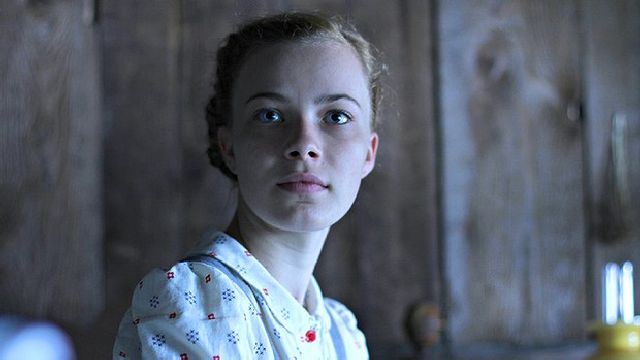Lore (2012) 
“When your life is a lie, who can you trust?”

Director: Cate Shortland
Cast: Saskia Rosendahl, Kai-Peter Malina, Nele Trebs
Synopsis: As the Allies sweep across Germany, Lore leads her siblings on a journey that exposes them to the truth of their parents’ beliefs. An encounter with a mysterious refugee forces Lore to rely on a person she has always been taught to hate.
The psychological impact of defeat on a nation emerging from a lengthy and bruising war is one that isn’t really addressed that often, and it’s perhaps understandable that it would take many years before that defeated nation would feel emotionally distanced enough to examine such a sensitive subject. In fact, although Lore was part-financed and filmed in Germany, it was made by Australian director Cate Shortland. Through the young teenage girl Lore (Saskia Rosendahl, giving a remarkably assured debut performance), Shortland, together with co-writer Robin Mukherjee takes us on a disturbing journey through a country whose inhabitants have been cast adrift by having all that they believed in ripped away from them. Not only that, they are faced with the stark realisation that the ideology they bought into is a deeply flawed and inhumane one.
The film opens with the return home of Lore’s father (Hans Jochen-Wagner), a Nazi officer, in the closing days of WWII. His return is not a happy one; he and his family must flee from the advancing allies. Lore’s father sends her and her mother (Ursina Lardi) and her four younger siblings to the country, but their sanctuary there is short-lived. It’s not long before Mutti is summonsed by the Americans. Knowing she won’t return, Mutti instructs Lore to take her brothers and sister to their grandmother’s home in Hamburg, many miles away. The relationship between mother and daughter is difficult, partly because of her mother’s disgust at what she calls her husband’s cowardice. Interestingly, it’s the women in the film who adhere most stringently to the Nazi doctrine that has shaped the German population’s lives for the past twelve years, insisting they have done nothing wrong.
Lore and her siblings embark on their exhausting journey, and the picture of immediate post-war Germany is a vivid one of a disunited country whose very foundations have been torn away. The children encounter mistrust, resentment, greed and casual death. Milk to feed Lore’s baby brother is brought direct from the breast of a mother for the price of a piece of jewellery, and the baby becomes a desirable commodity because he can be used to win the American soldiers’ sympathy, but the other children are not wanted and we never see one iota of compassion for their plight from the adults they meet. Desperation induces a state of every man for himself, and the children’s prospects look increasingly bleak until they fall in with a young Jew named Thomas (Kai Malina).
So deeply ingrained within Lore is the Nazi doctrine that she instantly mistrusts Thomas because of his religion, despite seeing photographs of concentration camps, one of which possibly shows her father overseeing the wholesale slaughter of Jews. But the attitudes she has been taught as a child conflict with her burgeoning sexuality and she finds herself attracted to him despite his faith. But Thomas is also a character of conflict, capable of carrying out unspeakable acts, and we are asked to consider whether the conditions in which they live mean he is a heartless killer or simply a survivor. This uncertainty about everything that once seemed so straightforward leaves both Lore and the viewer feeling disorientated and confused.
Lore has to be one of the bleakest and most melancholic movies to be released in recent times. Its grimness is unrelenting. It’s one of those movies that leaves you feeling unclean after watching it, but in a way that suggests that it has exposed an unpalatable and unshakeable aspect of the human condition. The certainty of our way of life, whether during a time of war or peace, hangs by a slender thread, and the veneer of civilisation is a thin one that quickly chips away when social order collapses. Using a handheld camera that views almost everything from Lore’s perspective, Shortland removes us from the detached comfort of our armchairs and immerses us in the awful, harsh reality of it all so that we feel at least some of her bewilderment. It’s not an easy or comfortable watch, but Lore is a movie that deserves to be seen.
httpv://www.youtube.com/watch?v=8v3rgP0Aqu8
